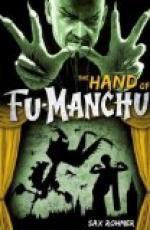In what degree this was actual, and in what due to a mind overwrought from endless conflict with the Yellow group, I know not to this day, but you who read these records of our giant struggle with Fu-Manchu and his satellites shall presently judge for yourselves.
When, at last, the brakes were applied, and the pillars and platforms of the great terminus glided into view, how welcome was the smoky glare, how welcome the muffled roar of busy London!
A huge negro—the double of the man I had overthrown—opened the door of the compartment, bestowing upon me a glance in which enmity and amazement were oddly blended, and the woman, drawing the cloak about her graceful figure, stood up composedly.
She reached for a small leather case on the rack, and her loose sleeve fell back, to reveal a bare arm—soft, perfectly molded, of the even hue of old ivory. Just below the elbow a strange-looking snake bangle clasped the warm-flesh; the eyes; dull green, seemed to hold a slumbering fire—a spark—a spark of living light.
Then—she was gone!
“Thank Heaven!” I muttered, and felt like another Dante emerging from the Hades.
As I passed out of the station, I had a fleeting glimpse of a gray figure stepping into a big car, driven by a black chauffeur.
CHAPTER XXXI
THE MARMOSET
Half-past twelve was striking as I came out of the terminus, buttoning up my overcoat, and pulling my soft hat firmly down upon my head, started to walk to Hyde Park Corner.
I had declined the services of the several taxi-drivers who had accosted me and had determined to walk a part of the distance homeward, in order to check the fever of excitement which consumed me.
Already I was ashamed of the strange fears which had been mine during the journey, but I wanted to reflect, to conquer my mood, and the midnight solitude of the land of Squares which lay between me and Hyde Park appealed quite irresistibly.
There is a distinct pleasure to be derived from a solitary walk through London, in the small hours of an April morning, provided one is so situated as to be capable of enjoying it. To appreciate the solitude and mystery of the sleeping city, a certain sense of prosperity—a knowledge that one is immune from the necessity of being abroad at that hour—is requisite. The tramp, the night policeman and the coffee-stall keeper know more of London by night than most people—but of the romance of the dark hours they know little. Romance succumbs before necessity.
I had good reason to be keenly alive to the aroma of mystery which pervades the most commonplace thoroughfare after the hum of the traffic has subsided—when the rare pedestrian and the rarer cab alone traverse the deserted highway. With more intimate cares seeking to claim my mind, it was good to tramp along the echoing, empty streets and to indulge in imaginative speculation regarding the strange things that night must shroud in every big city. I have known the solitude of deserts, but the solitude of London is equally fascinating.




